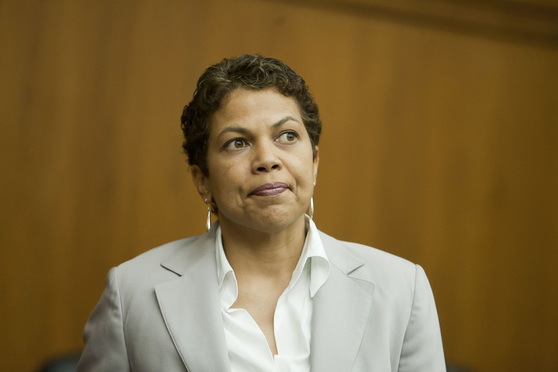 U.S. District Judge Tanya Chutkan.
U.S. District Judge Tanya Chutkan.
Photo: Diego M. Radzinschi/NLJ
A federal judge in Washington, D.C., appeared hesitant to create a new path for litigation against President Donald Trump’s latest travel ban proclamation Thursday.
U.S. District Judge Tanya Chutkan said in a hearing that while district courts in Maryland and Hawaii have already enjoined the Sept. 24 order implementing travel restrictions on immigrants from eight countries, she is not eager to wade into immigration and national security issues better left for the executive and legislative branches to handle.
“This court is very leary about ordering people to be admitted [into the country],” the judge said.
The lawsuit, brought by several Iranian-American advocacy groups and affected individuals, asks the court to enjoin the Sept. 24 order as well as an Oct. 23 memorandum and subsequent Oct. 24 order that bans refugees from 11 countries for 90 days, and subjects them to enhanced vetting procedures.
The groups originally brought the lawsuit in February, and amended it to address the second travel ban order issued March 6. Chutkan stayed the litigation following injunctions against that order from courts in Maryland and Hawaii.
 John Freedman of Arnold & Porter Kaye Scholer.
John Freedman of Arnold & Porter Kaye Scholer.
Arnold & Porter Kaye Scholer partner John Freedman, who argued Thursday for the plaintiffs, said the other two courts who enjoined the travel ban did so on different legal grounds, and that the court should consider the novel theories the D.C. case presents, such as that the proclamation is contrary to U.S. law under the Administrative Procedures Act.
He said U.S. Supreme Court precedent indicated it would actually prefer multiple challenges in different circuits, should the issue rise to that level, because it would give them a plethora of arguments to consider. He added the D.C. Circuit has particular expertise in government affairs, and that the record on travel ban cases would be enhanced by its input.
“I think the D.C. Circuit’s influence in this could be the critical difference,” Freedman told the judge.
DOJ lawyer Hashim Mooppan, who argued for the government, said the plaintiffs have not suffered irreparable harm because of the existing injunctions. Mooppan also argued the courts should not be involved in reviewing policy determinations from the executive branch at all. Responding to the plaintiffs’ arguments that Trump intended to ban Muslims with the order and that cabinet secretaries from the Department of Homeland Security and U.S. Department of State were carrying out those wishes, Mooppan said it would be “remarkable” if entire agencies were engaged in a “massive charade” in issuing the policy.
“This court should think very carefully before it levels such a serious charge,” Mooppan told the judge.
The judge said she plans to rule on the preliminary injunction motion soon, but did not offer a timeline.



